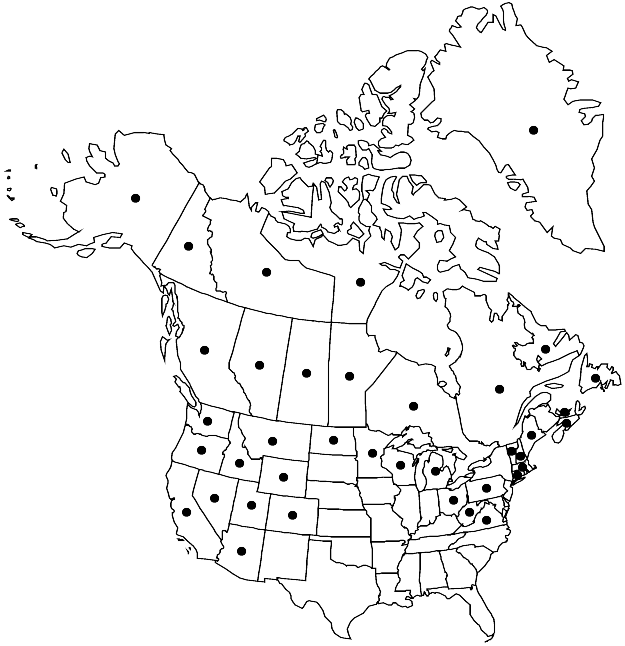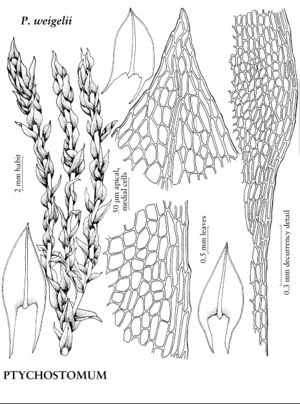Difference between revisions of "Ptychostomum weigelii"
Phytologia 87: 22. 2005.
FNA>Volume Importer |
imported>Volume Importer |
||
| (6 intermediate revisions by 2 users not shown) | |||
| Line 9: | Line 9: | ||
|special_status={{Treatment/ID/Special_status | |special_status={{Treatment/ID/Special_status | ||
|code=F | |code=F | ||
| − | |label= | + | |label=Illustrated |
}} | }} | ||
| − | |basionyms={{Treatment/ID/ | + | |basionyms={{Treatment/ID/Basionym |
|name=Bryum weigelii | |name=Bryum weigelii | ||
|authority=Sprengel | |authority=Sprengel | ||
| + | |rank=species | ||
| + | |publication_title=Mant. Prim. Fl. Hal., | ||
| + | |publication_place=55. 1807 | ||
}} | }} | ||
|synonyms= | |synonyms= | ||
| Line 30: | Line 33: | ||
|elevation=low to high elevations (0-3500 m) | |elevation=low to high elevations (0-3500 m) | ||
|distribution=Greenland;Alta.;B.C.;Man.;Nfld. and Labr.;N.W.T.;N.S.;Nunavut;Ont.;P.E.I.;Que.;Sask.;Yukon;Alaska;Ariz.;Calif.;Colo.;Conn.;Idaho;Maine;Mass.;Mich.;Minn.;Mont.;Nev.;N.H.;N.Dak.;Ohio;Oreg.;Pa.;Utah;Vt.;Va.;Wash.;W.Va.;Wis.;Wyo.;South America;Eurasia;Africa;Pacific Islands (New Zealand);Australia. | |distribution=Greenland;Alta.;B.C.;Man.;Nfld. and Labr.;N.W.T.;N.S.;Nunavut;Ont.;P.E.I.;Que.;Sask.;Yukon;Alaska;Ariz.;Calif.;Colo.;Conn.;Idaho;Maine;Mass.;Mich.;Minn.;Mont.;Nev.;N.H.;N.Dak.;Ohio;Oreg.;Pa.;Utah;Vt.;Va.;Wash.;W.Va.;Wis.;Wyo.;South America;Eurasia;Africa;Pacific Islands (New Zealand);Australia. | ||
| − | |discussion=<p>Ptychostomum weigelii is a common arctic-boreal to north-temperate species in wet sites, easily identified by the broad, long marginal decurrencies of the leaves that nearly reach to the next leaf. Leaves of the similar P. cyclophyllum and P. turbinatum are either not decurrent or only produce short, very slender decurrencies. Plants of P. weigelii from Colorado are pinkish red.</p> | + | |discussion=<p><i>Ptychostomum weigelii</i> is a common arctic-boreal to north-temperate species in wet sites, easily identified by the broad, long marginal decurrencies of the leaves that nearly reach to the next leaf. Leaves of the similar <i>P. cyclophyllum</i> and <i>P. turbinatum</i> are either not decurrent or only produce short, very slender decurrencies. Plants of <i>P. weigelii</i> from Colorado are pinkish red.</p> |
|tables= | |tables= | ||
|references= | |references= | ||
| Line 39: | Line 42: | ||
-->{{#Taxon: | -->{{#Taxon: | ||
name=Ptychostomum weigelii | name=Ptychostomum weigelii | ||
| − | |||
|authority=(Sprengel) J. R. Spence | |authority=(Sprengel) J. R. Spence | ||
|rank=species | |rank=species | ||
| Line 53: | Line 55: | ||
|publication title=Phytologia | |publication title=Phytologia | ||
|publication year=2005 | |publication year=2005 | ||
| − | |special status= | + | |special status=Illustrated |
| − | |source xml=https:// | + | |source xml=https://bitbucket.org/aafc-mbb/fna-data-curation/src/2e0870ddd59836b60bcf96646a41e87ea5a5943a/coarse_grained_fna_xml/V28/V28_279.xml |
|genus=Ptychostomum | |genus=Ptychostomum | ||
|subgenus=Ptychostomum subg. Ptychostomum | |subgenus=Ptychostomum subg. Ptychostomum | ||
Latest revision as of 21:34, 5 November 2020
Plants in loose low open turfs, green or rarely pinkish red. Stems 2–4(–6) cm, fertile stems comose, innovations evenly foliate. Leaves green, yellow-green, or rarely red or pink, distant, strongly contorted to shrunken when dry, ovate-lanceolate, flat, 1–3 mm, not much enlarged toward stem apex; base usually green, strongly and broadly decurrent, decurrencies almost reaching next more proximal leaf; margins revolute proximally, plane distally, limbidium weak, in 1 (or 2) rows; apex acute; costa not reaching apex to short-excurrent, awn slender; proximal laminal cells hexagonal to rectangular, 3–4:1; medial and distal cells 18–25(–30) µm wide, 2–3:1, walls thin. Specialized asexual reproduction absent. Sexual condition dioicous. Seta red-brown, 2–4 cm, slender, straight to somewhat flexuose. Capsule brown, turbinate to pyriform, symmetric, 3–4 mm, mouth yellow; operculum convex, apiculate; peristome well developed; exostome teeth yellow basally, hyaline distally, lamellae straight, pores absent near base along mid line; endostome not adherent to exostome, basal membrane 1/2 exostome height, segments broadly perforate, cilia well developed, long, appendiculate. Spores (12–)14–18 µm, yellow or green.
Phenology: Capsules mature Jun–Aug.
Habitat: Wet soil, wetlands, along streams
Elevation: low to high elevations (0-3500 m)
Distribution

Greenland, Alta., B.C., Man., Nfld. and Labr., N.W.T., N.S., Nunavut, Ont., P.E.I., Que., Sask., Yukon, Alaska, Ariz., Calif., Colo., Conn., Idaho, Maine, Mass., Mich., Minn., Mont., Nev., N.H., N.Dak., Ohio, Oreg., Pa., Utah, Vt., Va., Wash., W.Va., Wis., Wyo., South America, Eurasia, Africa, Pacific Islands (New Zealand), Australia.
Discussion
Ptychostomum weigelii is a common arctic-boreal to north-temperate species in wet sites, easily identified by the broad, long marginal decurrencies of the leaves that nearly reach to the next leaf. Leaves of the similar P. cyclophyllum and P. turbinatum are either not decurrent or only produce short, very slender decurrencies. Plants of P. weigelii from Colorado are pinkish red.
Selected References
None.
